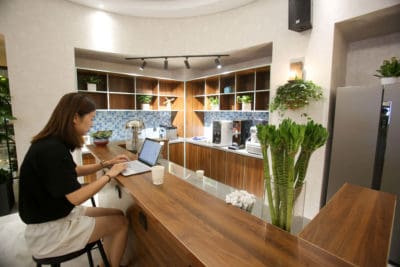
Zhong Shu’s Kr Space completed a RMB 600 million financing round
Chinese co-working startup Kr Space has completed a new RMB 600 million ($92 million) financing round to accelerate its expansion in China’s top-tier cities, bringing its total funds raised to RMB 1.1 billion ($170 million), the company announced.
The capital haul marks the third financing round in six months for Beijing-based Kr Space, a spinoff of Alibaba-backed technology platform 36Kr, according to an article on the company’s media portal, 36Kr.com. Kr Space describes the deal as the largest-ever financing round by a shared office operator in China.
Kr Space’s announcement comes after Beijing-based rival Ucommune (formerly known as UrWork) announced last August it had closed a RMB 1.2 billion ($178 million) round of financing from a group of mainland investors. Both Ucommune and Kr Space are far outstripped by US co-working giant WeWork, which last July unveiled a $500 million investment in its China operation led by Japan’s SoftBank and China’s Hony Capital.
IDG-Funded Provider Plans More Centres
Since it was spun off in January 2016, Kr Space has won investment from venture capital firms IDG Capital, China Minsheng Investment Management, Gobi Partners, Unity Ventures, Colony New Yangtze Fund, and Prometheus Capital, a fund established by Chinese tycoon Wang Jianlin’s son Wang Sicong. The company revealed a previous round of financing last September, adding RMB 100 million ($15 million) from existing backers.
The latest capital infusion, which Kr Space terms a “pre-B” financing round, will be used to accelerate the brand’s expansion in top-tier cities, according to the report. Originally formed by 36Kr in 2014, the company has expanded into nine cities including Beijing, Shanghai and Guangzhou with a network of 30 centres targetted at online startups.
Kr Space expects to open up to 100 centres by 2019. The company boasts an occupancy rate of 94.2 percent for its office spaces as of April 2017, according to a media release.
Mainland Co-Working Expansion Continues

A Kr Space centre on South Henan Road in Shanghai
Kr Space’s competitors in China are also expanding aggressively. Valued at $1.3 billion, Ucommune owns around 70 centres in mainland China and has recently announced it would open its first centres in Hong Kong and Taiwan. Shanghai-based operator naked Hub has 11 upcoming locations in China, adding to its current portfolio of 14 high-end centres.
In a move to stand out amongst the crescendoing competition, Kr Space offers a unique office space design combining three distinct areas into a single centre. The design, dubbed Kr Space 4.0, includes a zone for members, another for private offices, and a smaller shared space covering 10 percent of the total floor area. The company’s president Zhong Shu said that this mixed model would better serve the needs of Internet entrepreneurs.
Co working is such a 2016 Investment strategy. Low barrier to entry and no distinguishing features means nearly all of the operators will fail. Naked Hub, Urwork, kr space, 3q, wework, etc etc etc. Essentially they have become similar to previously P2P occupants. Can’t lease out your empty office? Find the one of 50 co-working offices to be a tenant. Can’t think of someone to occupy your failing retail podium? Co-working is your answer. I like how “consolidation” is sometimes framed as a combining of power houses when in fact it is a demonstration of oversupply of co-working operators with no hope of making any profit.